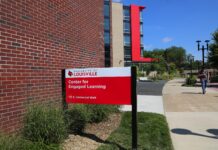
LOUISVILLE, Ky. – The Department of Psychiatry and Behavioral Sciences at the University of Louisville School of Medicine has partnered with a community mental health center to bring telepsychiatry to rural residents, most of whom would otherwise have difficulty obtaining care.
The department and The Adanta Group this month received an honorable mention from the Mid-Atlantic Telehealth Resource Center’s Breaking Barriers through Telehealth awards for bridging gaps to mental health care in rural Kentucky and providing an innovative way to train resident physicians.
The collaboration began in 2015, transplanting the well-established model for teaching residents in a clinical setting to a video teleconferencing platform that connects patients at a rural mental health care facility to UofL psychiatrists. Through the partnership, UofL provides telepsychiatry primarily in Casey and Taylor Counties.
“Telepsychiatry often means the difference between care and no care for some rural patients,” said Robert Caudill, M.D., UofL Physicians – Psychiatry, residency training director and associate professor of the UofL Department of Psychiatry and Behavioral Sciences. “These patients can go long periods of time between appointments because they have to travel far from home for care or available slots are filled. Rural health facilities have a difficult time recruiting and maintaining medical staff.”
UofL has helped maintain Adanta’s staffing level without having to rely on temporary doctors who are typically expensive to employ. In turn, Adanta increased the length of appointments to allow residents time to learn under faculty supervision.
“We provide university-based physicians who are working with the clinics consistently and Adanta didn’t have to hire us at 40 hours a week,” Caudill said. “I could be there for four hours an afternoon in an isolated clinic, and with the click of a mouse, treat patients in a different clinic without having to drive somewhere. The logistics are persuasive.”
Telepsychiatry has other benefits to the patient. Stigma surrounding mental health treatment is reduced because the process of going to appointments is more private. It’s also less intimidating to patients who have experienced trauma to meet with a physician through a video monitor, Caudill said.
As mental health services transition from relying on traditional office visits, UofL psychiatry residency graduates are prepared to integrate technology into their clinical practice.
Timothy Bickel, telehealth director at the UofL School of Medicine, said training resident physicians in telemedicine should expand beyond psychiatry.
“Medical students and residents get attention from prospective employers for being involved in telehealth,” Bickel said. “Students should at least have the opportunity to be exposed to telehealth.”
#WeAreUofL





























